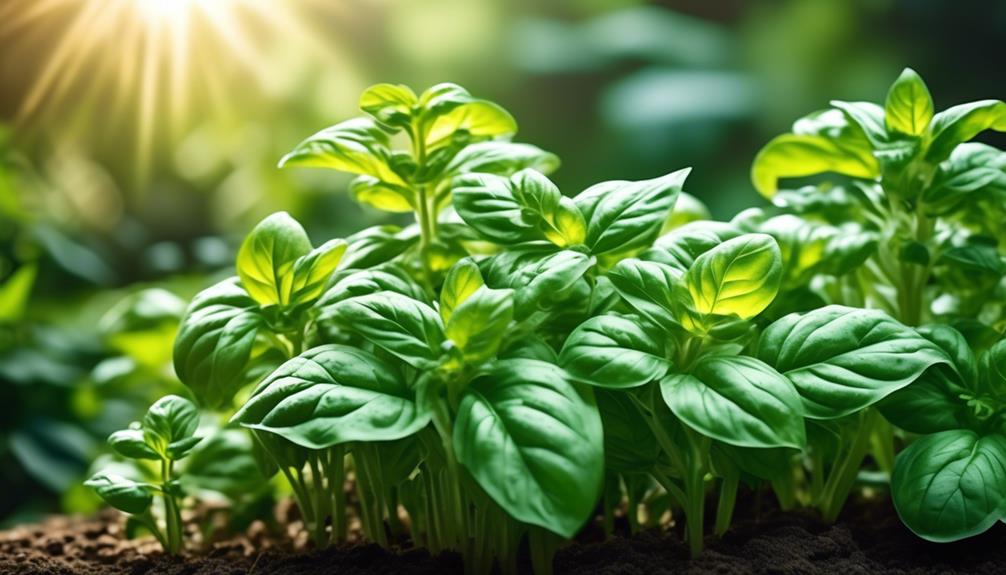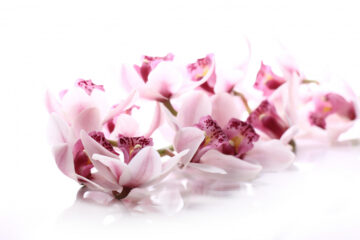So, you think you have a green thumb and want to add a touch of regality to your garden? Well, look no further than the majestic herb known as basil.
With its fragrant allure and rich history, basil has been captivating gardeners and chefs alike for centuries. But there’s more to this herb than meets the eye, and in this discussion, we will uncover the hidden depths of basil’s aromatic charm.
From its medicinal properties to its spiritual significance, we will explore the many facets of basil that make it a truly royal addition to any garden.
So, get ready to embark on a journey that will leave you craving for more…
Basil’s Medicinal Properties
Basil’s medicinal properties make it a valuable herb for promoting health and well-being. With its fragrant allure, basil has been hailed as the royal herb throughout history. It possesses antibacterial and anti-inflammatory properties, making it a natural remedy for various ailments.
Basil is also rich in antioxidants, which help protect the body from free radicals and reduce the risk of chronic diseases. Additionally, this herb may help reduce stress and improve mental clarity, providing a sense of calm and focus.
Different varieties of basil, such as lemon, lime, cinnamon, licorice, or anise, offer distinct fragrances and flavors, making them not only useful in the kitchen but also for their medicinal benefits.
Incorporating basil into your daily routine can enhance your overall well-being and add a touch of royalty to your life.
Story and Origins
With its rich history and origins dating back thousands of years, basil has captivated cultures around the world. Originating in India and cultivated for over 5,000 years, basil made its way to Europe through the Greeks and Romans. In ancient civilizations, basil was considered sacred and associated with love, fertility, and protection against evil spirits and witchcraft. Today, basil continues to enchant gardeners and culinary enthusiasts alike with its fragrant allure and versatile uses. From Italian dishes to traditional medicine, basil adds depth and complexity to meals while providing antibacterial properties and digestive benefits. With various varieties like lemon basil, Genovese basil, and Thai basil, each with its own distinct fragrance and flavor, basil truly reigns as the royal herb in the garden.
| Fact | Fact |
|---|---|
| Basil has a rich history and origins dating back 5,000 years | Basil was considered sacred and associated with love, fertility, and protection against evil spirits and witchcraft |
| Basil was introduced to Europe by the Greeks and Romans | Basil has diverse culinary and medicinal uses |
| Basil has various varieties with distinct fragrance and flavor | Basil adds depth and complexity to meals |
| Basil is a versatile herb in the kitchen | Basil continues to captivate cultures worldwide |
Basil’s Aromatic Culinary Uses
One way to fully appreciate basil’s aromatic culinary uses is by incorporating it into various Italian dishes, such as pesto and caprese salad. Fresh basil, especially the traditional sweet basil variety, adds a delightful fragrance and flavor to these dishes.
Basil plants are easy to grow and can provide an abundant supply of leaves for cooking. Pesto sauce, made with basil, garlic, pine nuts, Parmesan cheese, and olive oil, is a classic Italian sauce that can be used as a pasta topping or a spread on sandwiches.
The combination of basil’s aromatic properties and its ability to enhance the flavors of other ingredients makes it a versatile herb that can elevate the taste of many dishes.
Basil’s Spiritual Significance
To truly understand the significance of basil beyond its aromatic culinary uses, you must delve into its spiritual associations and rich history.
Basil has been considered a sacred herb in ancient civilizations, associated with love, fertility, and protection against evil spirits and witchcraft. Its leaves were believed to bring prophetic dreams when placed under a pillow and could detect infidelity in ancient times.
Basil’s spiritual significance isn’t limited to its leaves alone. Varieties of basil, such as holy basil, are especially revered for their spiritual and medicinal properties. Even basil seeds hold spiritual importance, often used in rituals and ceremonies.
Basil Watering Techniques
For optimal growth and health, ensure that you water your basil plants deeply once a week, making sure the soil is moist to a depth of 1-2 inches. This is an essential part of basil watering techniques to keep your plants thriving in the garden.
However, it’s important to avoid overwatering, as this can lead to root rot. Allow the soil to dry out slightly between watering to prevent this issue.
When watering, focus on the base of the plant and try to do it in the morning. This allows the foliage to dry throughout the day, reducing the risk of disease. Consider using a soaker hose or drip irrigation system to water directly at the soil level, avoiding wetting the foliage.
Additionally, adjust your watering frequency based on weather conditions. Increase watering during hot and dry periods, and reduce it during cooler and wet spells.
Following these basil watering techniques will help your plants maintain their fragrant allure in the garden.
Occasions for Gifting Basil
Consider gifting basil plants as a thoughtful and unique way to celebrate cooking, gardening, or the love for fresh, aromatic herbs. Basil plants make a meaningful gift for gardeners, chefs, or anyone who appreciates the fragrant allure of herbs. Whether it’s a housewarming, birthday, or Mother’s Day, gifting basil plants is perfect for occasions that honor cooking and gardening.
During the holiday season, basil plants can be a practical and distinctive gift for those who enjoy using fresh herbs in their winter dishes. For friends or family members passionate about organic, home-grown produce, gifting basil plants can be a thoughtful gesture. Additionally, consider giving basil plants as a token of appreciation or a gesture of goodwill, such as thanking a host or hostess after a dinner party.
Embrace the joy of gifting basil and share the beauty of the garden with others.
Concluding Thought
Now that you’ve explored the occasions for gifting basil and the joy it brings to both gardeners and chefs, let’s take a moment to reflect on the overall allure of this remarkable herb. Basil’s versatility in the garden and kitchen makes it an essential herb for any herb enthusiast. The rich history and symbolism of basil add an intriguing layer of allure to its cultivation and use. Whether it’s the fragrant allure, ease of cultivation, or the myriad of varieties, basil is a must-have for any herb garden. Embracing basil in all its forms, from planting to harvesting and using it in various recipes, allows for a delightful journey into the world of herbs.
| 1 | Basil is versatile in the garden and kitchen. | Basil’s versatility makes it an essential herb for any herb enthusiast. |
| 2 | Basil has a rich history and symbolism. | The rich history and symbolism of basil add an intriguing layer of allure to its cultivation and use. |
| 3 | Basil has a fragrant allure and is easy to cultivate. | Whether it’s the fragrant allure or the ease of cultivation, basil is a must-have for any herb garden. |
| 4 | Basil comes in a variety of types. | The myriad of basil varieties further enhances its allure in the garden. |
| 5 | Basil is a delightful herb to explore. | Embracing basil in all its forms allows for a delightful journey into the world of herbs. |
Frequently Asked Questions
What Are the Benefits of the Herb Basil?
You’ll love the benefits of basil! It’s antibacterial, anti-inflammatory, and packed with antioxidants. It can reduce stress, improve mental clarity, and aid digestion. Plus, its fragrance adds magic to any dish.
Why Is Basil the Royal Herb?
Basil is the royal herb because of its magnificent fragrance and rich history. Different varieties emphasize distinct fragrances, adding character to cuisine. It is easy to grow and offers medicinal benefits.
What Does the Basil Symbolize?
Basil symbolizes love, fertility, and protection against evil spirits. It has a rich history dating back over 5,000 years and is associated with Greek mythology. In some cultures, basil was even used to detect infidelity and bring prophetic dreams.
Does Basil Come Back Every Year?
Does basil come back every year? Oh, it sure does! Just let a few plants flower and go to seed, and voila! You’ll have a never-ending supply of this fragrant herb in your garden.





